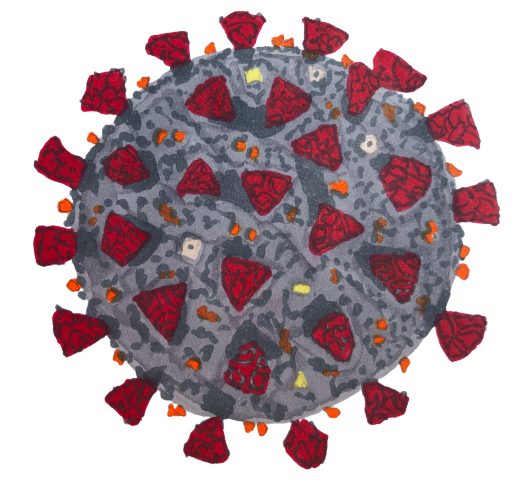By Nicky Kobayashi-Boyd, Third Year, Biology
As COVID-19 hospital admissions fall in the UK and more patients are recovering, persisting ‘long COVID’ symptoms are highly reported. Three quarters of a study cohort in Bristol reportedly suffered from fatigue and breathlessness weeks after hospitalisation and many experienced a drop in quality of life.
As part of the DISCOVER project, researchers at the North Bristol NHS Trust will release the first UK study to investigate the long-term effects of COVID-19, reported recently in the BBC as ‘long COVID’.
110 confirmed COVID-19 patients were recruited from Southmead Hospital in North Bristol and participated in an 8-12 week review after hospital discharge. 74 per cent of the cohort reported persistent symptoms.

The most common symptoms reported were excessive fatigue and breathlessness – seen in 39 per cent of the test group. Of the released patients, 24 per cent reported insomnia, with muscle and joint pain being a frequent long-term symptom.
Many in the cohort additionally reported a lower health-related quality of life. Questionnaires answered by the patients revealed that many struggled to carry out daily tasks due to the long-term effects of COVID-19.
These findings are currently awaiting formal peer review, however the statistics follow many colloquial reports in the media, of COVID-19 patients continuing to suffer from long-term symptoms, even post COVID-19. Sufferers may find it difficult to carry on with work, studies, or hobbies, but do not receive the same medical attention as those currently testing positive for COVID-19.
Our Coronavirus research has been making headlines across the world recently for its first findings on the impact of #LongCovid
— SouthmeadHospCharity (@SuperSouthmead) September 5, 2020
👉Find out more about the vital research we're raising funds for and how your donations can ensure this vital work continues: https://t.co/qTfbPoj0sE pic.twitter.com/wc28yXFb6U
The DISCOVER study cohort was grouped by the severity of their COVID-19 infection: from mild, moderate, to severe. Mild disease was defined in the study as patients with ‘no requirement for oxygen or enhanced care during stay’. Moderate disease required oxygen while in hospital, and severe disease included requirement for non-invasive ventilation, admission into the ICU, or eventual death.
Although persistent symptoms were more common in patients with moderate or severe disease, 59 per cent of those currently in the mild infection category still report long-term effects.
‘This research firmly puts Bristol at the heart of advancing the knowledge of coronavirus’
Chest radiograph and blood results were also carried out on the group. Lung health was found to improve for most patients that still report persisting symptoms, signalling no damage to the lungs.
Reassuringly, the study suggests COVID-19 does not seem to cause lasting damage to the respiratory system, however the origins of the ‘long COVID’ symptoms remain unsolved. Dr David Arnold, a NIHR Doctoral Research Fellow at the Bristol Medical School and leader of the DISCOVER study, commented: ‘Abnormalities on X-rays and breathing tests are rare in this group. Further work in the DISCOVER project will help us to understand why this is, and how we can help coronavirus sufferers’.
Proud to present our follow up data on our COVID-19 DISCOVER cohort here in @ResearchNBT @NorthBristolNHS @BristolARU . Important implications for #LongCovid, follow up, and policy makers (@BTSrespiratory). https://t.co/cA8qk7tQzc pic.twitter.com/Fr23se8L1q
— Gus Hamilton (@gushamilton) August 16, 2020
The DISCOVER study routinely takes samples from COVID-19 patients to further researcher’s knowledge of the novel virus. It is assisted by the Southmead Hospital Charity and the Elizabeth Blackwell Institute at the University of Bristol.
Sarah Harrison, the director of the Southmead Hospital Charity, said: ‘We are proud to have been able to support this vital research project which has already enabled clinicians to develop their understanding of this disease and its longer term effects.’
‘This research firmly puts Bristol at the heart of advancing the knowledge of coronavirus and how it shapes the medical landscape going forward.’
Bristol University confirms more than 1000 cases of COVID-19
Exclusive interviews with COVID-19 vaccine trial participants
Research on the long-term symptoms of COVID-19 has been neglected globally. This innovative Bristol study has therefore highlighted a necessary focus on the wellbeing of patients after hospital discharge and can help to prepare global health services for post COVID-19 care. Dr David Arnold concludes: ‘Future studies should focus on the role of rehabilitation and psychological services for sufferers of ongoing COVID-19 symptoms.’
Featured image: University of Bristol
Have you continued to experience symptoms after recovering from COVID-19?









